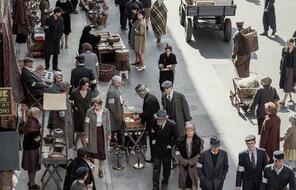Diplomats and the Choice to Rescue
At a Glance
Subject
- History
- The Holocaust
For every rescuer, from individuals like Marion Pritchard (see reading, Deciding to Act) to groups in communities like Le Chambon, France (see reading, Le Chambon: A Village Takes a Stand), the decision to help was shaped by a combination of will and circumstances. Diplomats stationed in Europe during World War II sometimes had unique opportunities to rescue vulnerable people from Nazi annihilation. As representatives of their countries' governments, they had various tools available, including the power to issue or approve the papers Jews needed to enter other countries. Perhaps the most famous diplomat rescuer was Raoul Wallenberg, the Swedish special envoy in Hungary, who is credited with saving tens of thousands of Jews by creating false papers and exit visas to allow them to emigrate, as well as establishing safe houses and a ghetto in Hungary to protect Jews from deportation. For Wallenberg and several other diplomats, opportunities to help involved serious risk, yet they chose to break the rules they had been asked to uphold and used their official status to find ways to help Jews and other victims escape.
In 1940, Chiune Sugihara was the Japanese consul in Lithuania. Like other international diplomats, he was based in Kaunas. The city was the capital of independent Lithuania and remained host to other countries’ consulates even after Lithuania fell into Soviet hands in June 1940. Kaunas was also home to a large Jewish population, which grew with the arrival of refugees fleeing persecution in Poland after the German invasion in 1939. As the Nazi army pushed across Europe in summer 1940, the Soviet Union ordered all foreign consulates and embassies to close down and move their diplomats to Moscow. At the same time, stateless Jewish refugees were asking these diplomats to help them get the necessary papers to flee to safety.
Amid this wartime confusion, Sugihara asked the Soviets for permission to stay in Lithuania a month longer. He was a striking exception: other diplomats obeyed the Soviet orders and quickly left. Sugihara received the extension and immediately put it to good use. He had been directed by the Japanese government not to issue any visas to Jews who lacked the proper documentation, but he decided to defy this order. Sugihara worked with a Dutch businessman and diplomat named Jan Zwartendijk, who provided the documents needed for travel to the Dutch-controlled island of Curaçao in the Caribbean. Sugihara then wrote thousands of transit visas that allowed people to travel out of Europe and pass through Japan en route to the island.
Sugihara’s wife, Yukiko, was with him in Kaunas. She later described how her husband came to the decision to help refugees escape:
At first my husband refused. “Japan is Germany’s ally and we cannot do this,” he said. The representatives of the refugees were persistent. “Our lives are in danger,” they said; “maybe it will be possible to issue some entry visas.” My husband consulted me and afterwards said that he would try and send a telegram to the Japanese Foreign Office, although he was sure that nothing would come out of it. “We will see what happens,” he said and sent the telegram. So my husband sent the telegram, but, as we had predicted, the answer was a flat no. “Negative, do not issue visas.”
. . . I said to my husband that in spite of everything we must help these people. We could not sleep at night. We kept thinking and thinking what to do. In addition to that, I had a baby, we had three young children. If my husband issues the visas contrary to the Foreign Office instructions, then when we return to Japan, my husband would for sure lose his job. Or even worse, we might be in danger from the Nazis ourselves: they might arrest us, or we might have to flee from them because we had helped Jews. My husband, myself and the children.
We were thinking and thinking what to do. But the representatives of the refugees begged and begged: “Please give us the visas.” Anyway, now there are only a few hundred, but thousands of Jews will arrive. My husband and I thought: these are the lives of thousands of human beings. 1
Over the course of 29 days, Sugihara worked around the clock to hand-write the transit visas. He was directly involved in the rescue of more than 3,000 Jews. His actions cost him his job and his pension; for a period after the war, he had to find work as a porter and door-to-door salesman before reestablishing himself in another career.
Selahattin Ülkümen, the Turkish consul on the Greek island of Rhodes, also chose to use his status as a diplomat to rescue Jews threatened with deportation and death. By July 1944, Germany was in control of Rhodes and announced a plan to round up the island’s 1,700 Jews and send them to Auschwitz. Ülkümen was deeply distressed to learn of this plan. He had arrived in Rhodes in 1943 and was haunted by what he knew about German actions in Europe. Worried about the fate of Turkish Jews on the island, he decided to protect as many as he could.
When the roundups started, Ülkümen pointed out to the Germans that Turkey had signed a neutrality agreement with Germany; he told them that harming any Turkish citizen would violate this agreement and that the Turkish Jews on Rhodes deserved the full protection of Turkey and should not be detained or deported. He also argued for other Jews to be accepted as Turkish citizens if they were married to someone with a Turkish passport. Finally, Ülkümen announced that his government did not differentiate between Muslims, Jews, or Christians and that it viewed itself as responsible for the safety of all its citizens. Through his persistence, he secured the release of 40 to 50 Jews who either had Turkish passports or were connected to family who did. Ülkümen’s son Mehmet later recalled:
My father, Selahattin Ülkümen, and my mother, Mihrinissa, were witnesses to part of this great tragedy unfolding before their eyes on the island of Rhodes toward the end of World War II. They saw the betrayal of God, the treachery of man, and the fall of humanity. They also saw how man could kill his own neighbor simply because he was different. They also realized how it was possible for people to close their eyes to the truth because of their own hatred, cowardice, or simply their indifference.
My father could not simply stand by and watch; he did not close his eyes, nor did he acquiesce in the hatred or indifference which existed. Instead, with my mother’s continuous support, he stood up, not as a hero, not as a diplomat, not as a Muslim, nor a Turk, but rather as a man, answering God’s call to protect his brother, a call that would later claim the life of the dearest person to him, my mother. 2
Although it isn’t entirely clear why, German planes later bombed Ülkümen’s residence, fatally injuring his pregnant wife and others. (Turkey by then had joined the Allied forces.) Ülkümen’s unborn son, Mehmet, was saved by the doctors, but upon hearing the news of the death of Ülkümen’s wife, her mother died by suicide. The majority of Rhodes’s 1,700 Jews were sent to Auschwitz, but those Ülkümen was able to save survived the war.
Connection Questions
- Because of their positions as diplomats, what opportunities were available to both Sugihara and Ülkümen to help them rescue Jews from the Nazis?
- What dangers and obstacles did the Sugiharas and Ülkümens consider before making their decisions to help rescue Jews? What finally persuaded them to act? What consequences did they face as a result of their choices?
- How did Sugihara and Ülkümen define their universes of obligation? What aspects of their identity may have influenced their choice to help?
- Where is the line between duty and conscience? When should ethical considerations take precedence over diplomats' duties to carry out their governments’ policies?
- What circumstances or personal qualities may lead one person and not another to do the right thing, regardless of the consequences they may face?
- 1Yukiko Sugihara, “USC Shoah Foundation Institute Testimony of Yukiko Sugihara,” USC Shoah Foundation (interview video file, 1997), United States Holocaust Memorial Museum collections.
- 2Mehmet Ülkümen, “Muslim Hero Saved Jews in Holocaust,” speech given at the Geneva Non-Governmental Gathering for the First Annual UN International Day of Commemoration in Memory of the Victims of the Holocaust, Geneva, Switzerland, January 27, 2006, YouTube, accessed May 20, 2016.
How to Cite This Reading
Facing History & Ourselves, "Diplomats and the Choice to Rescue," last updated August 2, 2016.








